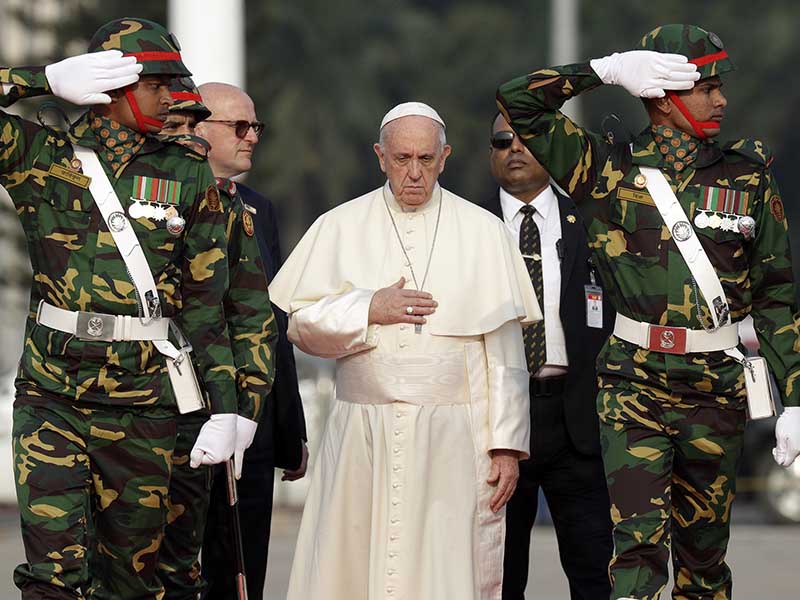DHAKA, Bangladesh (RNS) — Pope Francis has arrived in Bangladesh, praising the country for welcoming refugees from neighboring Myanmar, though he still refrained from identifying them as Rohingya Muslims.
Bangladesh is the second and final leg of one of the most politically fraught trips of Francis’ papacy, where his outspoken concern for refugees has been tempered by sensitivities on the ground.
In a speech Thursday (Nov. 30) before President Abdul Hamid and other government officials at the Presidential Palace, Francis praised Bangladesh for welcoming “refugees from Rakhine state” and called on other nations to help deal with the crisis.
“None of us can fail to be aware of the gravity of the situation, the immense toll of human suffering involved, and the precarious living conditions of so many of our brothers and sisters, a majority of whom are women and children, crowded in the refugee camps,” he said.
On Friday, Francis will host an interfaith peace meeting in the garden of the archbishop of Dhaka’s residence at which a small group of Rohingya Muslims is expected attend.
Hundreds of thousands of Rohingya have fled to Bangladesh from neighboring Myanmar, and Francis’ visit to both countries this week put him at the center of a major humanitarian crisis.
A more cautious pontiff than the 80-year-old Francis might have avoided such a crisis and stayed home. But this pope has shown himself willing to take risks, and he’s had to walk a diplomatic tightrope act, particularly in the country formerly known as Burma, never before visited by a pope.
In the Buddhist-majority nation, many are fearful of Islam and rather than see the Rohingya as long-established citizens, they treat them as recent arrivals from Bangladesh and also as potential terrorists.
Even using the word “Rohingya” is considered inflammatory. Francis has so far avoided using the term during this trip even though he has done so on more than one occasion at the Vatican.
That led to criticism from some rights groups and Western commentators, particularly given that the United Nations had described the Rohingya’s treatment as ethnic cleansing.
“Vatican diplomacy is not infallible,” Greg Burke, Holy See spokesman, said in response to the criticisms. But he stressed the pope’s nonuse of the word did not negate what he had said in the past about the Rohingya and what he might have said in private, hinting that the pontiff did raise their plight in his meetings.
The Rohingya suffered along with other ethnic groups at the hands of Myanmar’s military, which from 1962-2011 ruled the country and still retains a powerful role.
While many outsiders hope Myanmar’s leader, Aung San Suu Kyi, will be able to lead a full transition to democracy, the generals are still in charge of areas such as home affairs, borders and Myanmar’s vast natural resources.
Francis has firsthand experience of living under a military regime in Argentina, and when the generals asked at the last minute for a meeting he agreed.
The Vatican said the meeting with Gen. Min Aung Hlaing and three officials from Myanmar’s bureau of special operations took place on Monday at the residence of the Myanmar archbishop and lasted about 15 minutes.
Francis also met with Suu Kyi. While she has been criticized internationally for her handling of the Rohingya matter, inside the country she is widely seen as the best hope for shepherding Myanmar to democracy. This is also a view strongly held by the Catholic Church on the ground, whose leaders advised the pope not to use the term Rohingya, arguing it could spark protests.
The U.S. ambassador to Bangladesh, Marcia Bernicat, was one of many envoys who also attended Francis’ speech in Dhaka, and she said his words are helping to raise awareness of the crisis.
“To me the most important thing is do they (the Rohingya) have a voice? And for everyone who bears witness to the suffering that they have been experiencing, we help give them, and we help amplify, their voice,” she said.
(Christopher Lamb is The Tablet’s Rome correspondent and is traveling on the papal plane. He is a contributor to RNS.)





